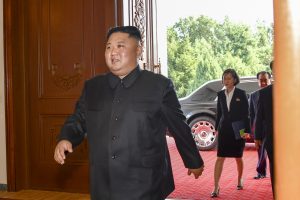During his first term, then-U.S. President Donald Trump was prompted to attempt negotiations with Pyongyang in an attempt to resolve the North Korean nuclear missile issue. The talks had come after tensions that arose in part because up until 2017, North Korean leader Kim Jong Un had been referring to Trump in derogatory terms, for instance calling him an “erratic old man,” while conducting a series of nuclear missile tests.
Even after the Hanoi summit ended without an agreement, North Korean media has since refrained from criticizing Trump. Now that Trump has been reelected, this self-restraint may open up new opportunities for the Kim administration. Trump has been critical of former President Barack Obama’s move to normalize diplomatic relations with Cuba, but he may see an historic improvement in relations between North Korea and the United States as his legacy. If so, then another U.S.-North Korea summit could be on the horizon.
In fact, on July 18, during his address accepting the Presidential Nomination at the Republican National Convention, Trump boasted, “I got along very well, [with] North Korea, Kim Jong Un… it’s nice to get along with someone who has a lot of nuclear weapons or otherwise.” There is no doubt that he is interested in the North Korean issue.
However, the Korean Central News Agency (KCNA) issued a commentary five days later titled, “Whether Second Hand of DPRK-U.S. Confrontation Stops or Not Depends on U.S. Act.” (DPRK is an abbreviation of North Korea’s formal name, the Democratic People’s Republic of Korea.) The piece sounded confident in the wake of Trump’s optimistic rhetoric, asserting that the U.S. was “buoying a lingering desire for the prospects of the DPRK-U.S. relations.” It also declared, “The DPRK … is fully ready for all-out confrontation with the U.S.” The commentary sought concessions, warning that “The U.S. had better make a proper choice in the matter of how to deal with the DPRK in the future, while sincerely agonizing the gains and losses in the DPRK-U.S. confrontation.” It further emphasized, “The foreign policy of a state and personal feelings must be strictly distinguished,” making North Korea’s refusal of concessions clear.
A clue to future U.S.-North Korean relations can be found in the 27 (at least) letters exchanged between the leaders of both countries from 2018 to 2019. In the final letter from Kim to Trump, the former speaks of his frustrations, writing, “In this vein, I have done more than I can at this present stage, very responsively and practically, in order to keep the trust we have. However, what has Your Excellency done, and what am I to explain to my people about what has changed since we met?” While the North Korea-United States summits were being held, North Korea suspended its nuclear missile tests and released detained U.S. citizens. However, Kim did not attempt to hide his resentment at the lack of actual gains for his country, such as a partial lifting of economic sanctions or suspension of U.S.-South Korea joint military exercises.
During his administrative policy speech in April 2019, Kim stated, “We will wait with patience until the end of the year for the United States to come up with a courageous decision,” but Trump made no concessions to North Korea. In 2020, both countries were too occupied with the COVID-19 pandemic to hold diplomatic summits, and in January 2021, the Biden administration was inaugurated. North Korea considered President Joe Biden’s strong condemnation of its human rights issues interference in its domestic affairs. It subsequently advanced its plans to strengthen its military power while shutting out diplomatic dialogue.
The Kim administration’s fundamental stance is to build up defense capabilities against the U.S. through the development of nuclear weapons. However, this alone cannot dispel the country’s security concerns or lead to the lifting of economic sanctions imposed by the United Nations Security Council. Resuming negotiations with the U.S. at some point would help Kim extend and solidify his administration. While there is no doubt that Pyongyang is keeping a close eye on Trump’s return to power, it is impossible to determine when negotiations might resume at present, as both leaders are hard to predict.
Moreover, it has been five years since the last summit. In that time, North Korea has not only made significant strides in its nuclear weapons program, it has also formed a strategic military alliance with Russia. Any resumption of negotiations between North Korea and the U.S. would become de facto arms control negotiations.
Kim succeeded in amending North Korea’s constitution to define South Korea as a “hostile state,” and he has disavowed North-South reunification. This has likely removed Seoul as a player in the North Korean issue.
Japan is also in a delicate position. Prime Minister Ishiba Shigeru has previously called for the establishment of “liaison offices” in both Japan and North Korea, but this would require public support to become a reality. The Ishiba administration is unlikely to oppose the resumption of negotiations between North Korea and the U.S., but it may apply pressure to stop certain U.S. concessions. While the second Trump administration is expected to have a stronger focus on its alliances with Japan and South Korea than the first administration, it is not hard to imagine that diplomacy over North Korea among these three countries could fracture once again.
































